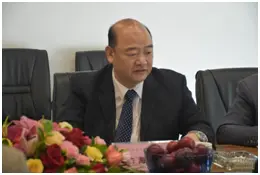Venezuelan President Hugo Chavez died Tuesday in a military hospital in Caracas, Vice President Nicols Maduro announced on the national radio and television.
With tears in his eyes, Mature addressed Venezuelans from the Doctor Carlos Arvelo military hospital, where Chavez passed his last two weeks after he came back from Cuba on Feb. 18.
"At 4:25 p.m. the commander President Hugo Chavez deceased," he said, calling the event a "historical tragedy" and urging Venezuelans to be vigilant for the peace of the country.
Image provided by the Presidency of Venezuela on Oct. 15, 2011 shows President Hugo Chavez participating in a meeting of the Council of Ministers before leaving for Cuba for a checkup at the Palace of Miraflores, Caracas, capital of Venezuela.(Xinhua/Presidency of Venezuela)
Accompanied by key members of the Executive Cabinet, Maduro offered thanks to the friends of brother countries. "In this time of sorrow, we thank you for your eternal solidarity," he said.
He also called on the Venezuelan people of all political sections to unite together. "Let there be no violence or hatred, but love, peace, unity and discipline," Maduro said. Meanwhile, Venezuelan Defense Minister Diego Molero Bellavia said in a statement that "The National Bolivarian Arms Force echoes the call for unity. We are being deployed to ensure the security and sovereignty of the Venezuelan people."
Chavez was born on July 28, 1954, in Venezuela's Barinas state, and graduated from the country's military academy in 1975 with a master's degree in military sciences. He also studied politics at Simon Bolivar University from 1989 to 1990.
In February 1992, as a paratrooper, Chavez led a failed coup against then President Carlos Andres Perez and was jailed until 1994.
A woman mourns in a gathering after the news of Venezuelan President Hugo Chavez death were released, in Caracas, Venezuela, on March 5, 2013. (Xinhua/Mauricio Valenzuela)
Nevertheless, in December 1998, Chavez won the presidency with 56 percent of votes after campaigning for reform, constitutional changes and a crackdown on corruption.
In 1999, he won 70 percent of the votes in a referendum on a new constitution that expanded executive power, and also formally committed the government to fulfilling citizens' rights to education, housing, healthcare and food.
Chavez was reelected to a six-year term under the new constitution with nearly 60 percent of votes in 2000.
Image provided by the Presidency of Venezuela on Feb. 15, 2012 shows President Hugo Chavez honoring during the ceremony conmemorating the 193 anniversary of the Congress of Angostura at Ciudad Bolivar, Venezuela. (Xinhua/Presidency of Venezuela)
On April 11, 2002, he was ousted in a brief coup by business leaders and dissident military officers, but was reinstated three days later by troops loyal to his government.
In December 2002, Venezuela's opposition called a nationwide strike demanding a referendum on his presidency. They won the right to do so in a May 2003 negotiated agreement.
A national campaign in favor of the referendum collected 2.5 million signatures by June 2004. Chavez easily won the referendum thanks to the support of the country's majority working class and poor.
On Oct. 7, 2012, Chavez was reelected to a third six-year term in presidential elections with 55.07 percent votes, despite his well-known battle with cancer.
He was first diagnosed with cancer in the summer of 2011, and underwent several operations to remove tumors in his pelvic region. The exact type of cancer was never revealed.
After months of chemotherapy treatment, he was declared cancer free and launched a reelection campaign, in which he redoubled his pledges to help the poor, saying he would put in place programs to eliminate homelessness within 10 years. He also aimed to have Venezuela surpass other countries in the region in education and healthcare during his next presidential term.
His failing health prevented him from attending his scheduled Jan. 10 inauguration, following a fourth cancer operation in Havana, Cuba on Dec. 11.
His post-operative recovery in Havana and later in Caracas was marked by bitter arguing between his aides and political opponents, who claimed he was too sick to lead.
Chavez reinvigorated the Latin American left by his example, and served to inspire leftist leaders in Ecuador, Bolivia and other countries.
He established a close political and personal relationship with Cuba's Fidel Castro, whom he considered a mentor, and frequently invoked the Caracas-born independence leader Simon Bolivar, who led Latin America's independence movements in the 19th century, as his main inspiration.
File photo taken on Aug. 21, 2011 shows Venezuelan President Hugo Chavez(C), with members of the group "Paz Dominicana", participating in a ceremony to pray for his full recovery, at the Palace of Miraflores, Caracas, capital of Venezuela. (Xinhua/AVN)
Chavez has been in power for 14 years.After seeking medical treatment for 70 days in Cuba, he returned home on Feb. 18. Since then, he had stayed in the Caracas military hospital.
 简体中文
简体中文

